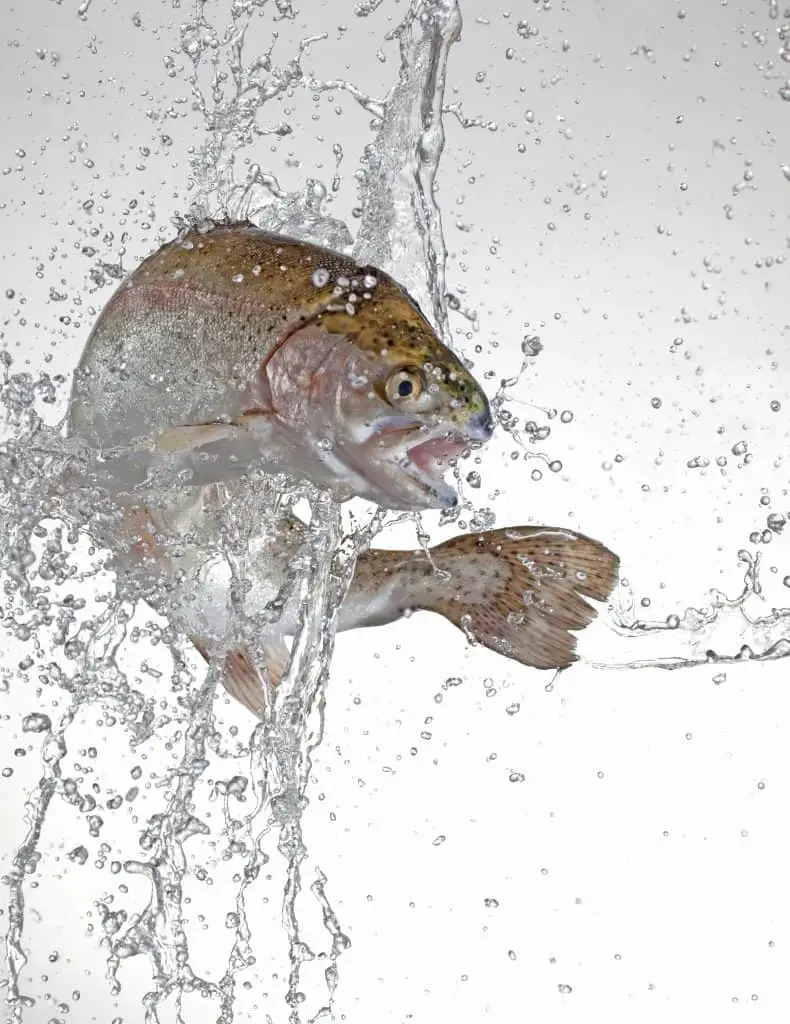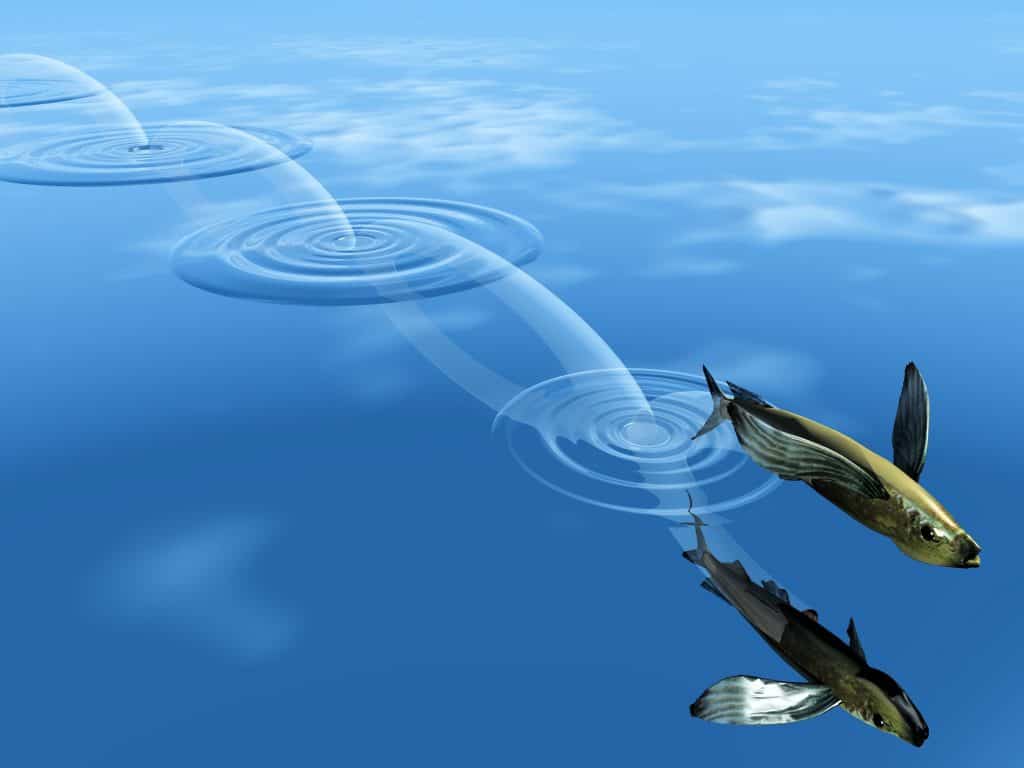One of the most common questions asked by anglers is why do trout jump out of the water? Trout are anadromous fish, which means they migrate from saltwater to freshwater rivers. This migration often includes swimming upstream and jumping out of the water in order to catch insects that fly over them.
However, there are other reasons for jumping out of the water. There are also differences between different trout species: Brookies hardly jump while rainbow trout are mostly associated with jumping higher. Let’s look at the 11 reasons why trout jump out of the water.

1. To chase emergers and capture prey like insects
Food motivates all living things including fish species. For trout, it gives them extraordinary feats hence the jumps. In this case, the emergers and other insects aren’t in the water. They are flying food in the air slightly above the surface of the water. Trout have to employ the jumping strategy to be feeding on them.
Trout easily target and catch insects that fly low. This is common during the mayfly season. Normally, trout are energy conservers and love to feed on the surface of the water to save it. Jumping consumes a lot of their calories but when there is a free hearty meal in prevalence, why not?
2. To escape predators
Jumping is not always for the joy of it after all – sometimes, trout jump because they have spotted predators on or near the water’s surface and want to get rid of them. This can be birds like ospreys that fish from above the water or mammals like river otters that swim underwater and use their front paws for hunting.
Furthermore, just like a hunter goes after a meal he sees will suit him, so does an angler. The two might involve predation but approach aspects are different. Trophy fish feed on smaller fish and a trout will feel the need to keep safe from the angler’s hook. This makes the aquatic food chain sustainable otherwise if all trout would have made themselves available to the predator, the chain would have crashed.
The length of a leap is actually often based on the intensity of fear and they can reach distances up to 25 feet in height, 12 times their own body length. This enables them to escape from predators quickly while at the same time keeping themselves out of sight underwater.
3. To drop external parasites
Trout too are affected by the occasional external parasite. You may think that because of their slippery gills and sharp fins, they are safe. Maybe not, because leeches, lice (Argulus), external protozoa, and Salmincola siscowet are common on the skin of trout.
The latter is very common in lake trout. Trout can’t counter such a parasite using their fins or mouths. The only option is to jump in desperation. Parasites that are loosely attached will fall back into the water waiting to cling on another fish. These parasites are irritating, uncomfortable, and the jump happens to be a way to get rid of them.
4. To adjust their temperature
Trout are cold-blooded fish. This means that their body temperature can vary with the water around them. When they jump, it’s not just for fun – but because if they stay too long in chilly water (below 50 degrees Fahrenheit), trout may get slow, seriously ill or die from hypothermia!
5. To readjust their bladders
When the trout’s swim bladder bulges, its volume increases thus displacing so much water. The fish becomes more buoyant and tends to float upwards then jumps. The jumping action readjusts the swim bladder, deflates it, and the buoyancy levels of the fish reduce. Fish sink displacing a little bit of water.

6. The presence of rain or a waterfall
Even sudden, heavy rain can spook them. If one trout jumps, it can cause a chain reaction by spooking the rest. A waterfall in the nature can obviously have the same effect and cause trout jumping.
7. In response to stress or getting spooked
A trout’s natural tendency is to jump when it becomes stressed, e.g. through vibrations and they tend do this in large numbers if one jumps first! Trout are also nervy and jump when spooked by kayaks, canoes or really any kind of boat.
8. For exercise and excitement
What do you do when you win a lottery that can change your life for the better? Exactly what you are thinking! Jump! Jump! Jump! That is what trout do when they are hyper and overly excited. Maybe a good trout psychologist can tell us what makes them this happy because our fancy speculations could be wrong here.
9. When young and attracting a mate
What do humans between the age of 9 and 20 behave like? This is a young stage full of life and enthusiasm. It is a similar case to smaller trout. Young trout are in the excellent physical condition and different from the otherwise similar salmon, jump to feel rejuvenated. The same enthusiasm humans in the above age bracket show what young trout experience.
10. To get over obstacles
Trout head upstream to lay their eggs and in areas with waterfalls, they can jump as high as 13 feet to get over a barrier. They do this by vertically swimming and jumping out of the water. Trout point their heads towards the direction they need to go and flex their backs to make their bodies assume an S shape. The tail faces one side and this makes the fish generate more thrust backward. The same technique the trout uses to get over an obstacle is the same they use when jumping to catch emergers, mayflies and other insects.
11. Getting the Angler’s Hook out of their Mouth
Have you had KFC and it stuck in between your teeth? The discomfort and rush to get a floss or bamboo toothpick are unexplainable. Trout feel worse when your fishing hooks and bait get stuck in their mouths. They go crazy and attempt to get the hook out by jumping.
When they flip and flop out of the water, they get more slack in the fishing line and the hook can easily get out. Most anglers have lost fish because they breach the water. To avoid losing as many in this manner, how fast you reel in the fish and how proficient you are with your trout rod will matter.
Does fly fishing make fish jump out of the water?
When you are on an outdoor fly fishing trip, fishing for trout and see one leaping out of the water for no apparent reason, you might be wondering if these fish are jumping for exactly the reason that you are currently fly fishing.
The answer is yes, because the trout are probably interested and trying to catch your fly that you’ve just casted out into the water in an attempt to get a dinner of their own. You can believe that if you caught a trout making a splash, it is extremely likely you fly fishing to some degree made a mark here.
Why are rainbow trout jumping higher than other trout?
A rainbow trout is a genetic variant of the cutthroat trout. They are named for their bright red-orange appearance, which comes from breeding with other species such as steelhead and Atlantic salmon. This coloration can also increase their sensitivity to visual stimuli, making them jump higher when they see objects in front of them like flies or a fisherman’s fly.
Rainbow trout are known to jump high because they are highly sensitive to visual stimuli and thus, react to objects they see. When you see those trout jumping, you can now know that they are feeling the vibration of you casting your fly out into the water.
Which other fish are known to be jumping out of water?
Besides trout, other fish that are known to occasionally breach the surface of the water are tarpon, bass, porpoises, salmon, pike and tuna. Also, octopus and squid are known to jump out of the water.
These other fish can be found in all different types of natural habitats, from saltwater environments with high salinity levels like oceans or bays to fresh-water sources such as rivers, lakes or ponds. Tuna is most commonly seen jumping in shallow waters because it does not usually jump very high.
Octopus, on the other hand, can jump as much as 20 feet out of water and are known to do so in order to catch prey or flee from predators. Squid also jumps fairly frequently when it is hunting for food but not usually any higher than about three feet above the surface of the water.
Wrap up
While trout jumps are beautiful scenery to the human eye, sometimes it gets nasty. Sometimes high jumpers like rainbow trout make mistakes and land in boats or tanks. You will be unlucky if the fins slice your body. Most trout anglers have their experiences with these chaps jumping.
Forget fish jumping out of your hands. We’d like to read yours in the comment section and let us know what you think about why do trout jump out of the water in your presence – could you have been planning to make it your lunch?